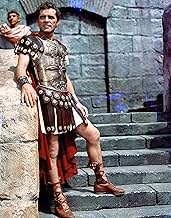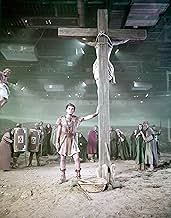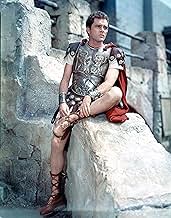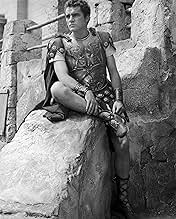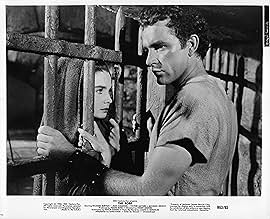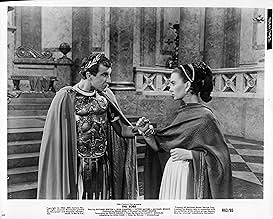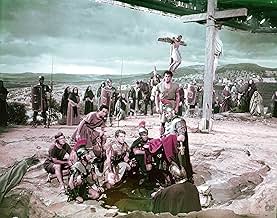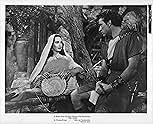Na Judeia, o tribuno Marcellus Gallio recebe ordens para crucificar Jesus de Nazaré e ganha a sua túnica num jogo de dados. Quando a sua vida muda para sempre, atormentado pela sua consciênc... Ler tudoNa Judeia, o tribuno Marcellus Gallio recebe ordens para crucificar Jesus de Nazaré e ganha a sua túnica num jogo de dados. Quando a sua vida muda para sempre, atormentado pela sua consciência pesada, parte a caminho da descoberta da fé.Na Judeia, o tribuno Marcellus Gallio recebe ordens para crucificar Jesus de Nazaré e ganha a sua túnica num jogo de dados. Quando a sua vida muda para sempre, atormentado pela sua consciência pesada, parte a caminho da descoberta da fé.
- Direção
- Roteiristas
- Artistas
- Ganhou 2 Oscars
- 7 vitórias e 6 indicações no total
- Citizen
- (não creditado)
- Judas
- (não creditado)
- Slave Dealer
- (não creditado)
- Citizen
- (não creditado)
Avaliações em destaque
If there is one failing with the story, and it is a minor one, Emperor Tiberias is presented as an honorable ruler and not as the depraved lecher he really was. He only comes off looking as well in history as he was because his grandson Caligula was so much worse.
This religious mammoth epic focuses a moving Roman pageant dealing with a sponger tribune , following his stirring career , spiritual awakening and reaches an exciting peak at the ending . It has marvelous images , spectacular scenes , enjoyable performances as well as the adequate cast of thousands . Richard Burton and Jean Simmons are both good , though Burton sometimes is a little wooden . Michael Rennie as Peter and Jeff Morrow as Paulus give sensible acting , though brief , which adds more to the reality than anything else . The best acting comes , indeed , from Jay Robinson , the best portrayal of his career , who gives a hammy acting as nasty Caligula . Colorful cinematography by Leon Shamroy and being the first film to be shot in glamorous CinemaScope . Sensitive and lyric musical score by the classic Alfred Newman . The film deservedly won 1953 Academy Award for Art Direction , Set Decoration, Color and Costume Design.
The motion picture is brilliantly directed by Henry Koster , an expert on super-productions and epic biographies , such as he proved in ¨Desiree¨, ¨The Virgin Queen¨, ¨A man called Peter¨, The story of Ruth¨ , ¨The Naked Maja¨ and of course ¨The Robe¨. It's followed by a sequel (1954) titled ¨Demetrius and the gladiators¨ by Delmer Daves with Debra Paget , William Marshall, Richard Egan , Susan Hayward as the trampy empress Messalina and in which the Marcellus's slave , Victor Mature , makes again a surprisingly good acting and reprised diverse characters as Jay Robinson as Caligula and Michael Wilding as apostle Peter.
The story of Christ on film is more important historically than may at first might appear. At either two or three reels, the first ever full "feature film" is arguably claimed to be the "The Passion Play" (1898), filmed in New York in 1897. The 'greatest story ever told' has hit the screen regularly thereafter, perhaps most famously in recent years with Mel Gibson's masterly personal tribute, "The Passion of the Christ" (2004).
I will now comment briefly on some of the technical and visual aspects of "The Robe". The camera work majors on long shots, and it is interesting to analyse how each shot is framed for all that width of screen. The camera is mostly static, and shots have longer than average duration; the compositions really are not designed for a lot of movement. This gives the film that famous "epic" style that goes for the grand sweep, both visually, musically and emotionally. There is not a lot of internalisation within the characterisation - it is the (literal) width and scope of the production that grabs attention. The filmic style is not very personal, however. It really is as if we have the best seats in an outdoor drama on a massive stage.
As you view, you may wish to make a note of the shots that seem to work best to the modern viewer. In the early part of the film, for instance, (just before the "Passion" sequence), Demetrius runs toward the camera in search of Jesus, after he's been beaten down by the Roman guards outside the gates of Jerusalem. An old lady sitting behind him on the cobbled pathway, has just finished tending his wounds. The shot is terrific, and works for modern audiences very well. Unlike a lot of the film, where much of the direction seems to be subjected to the demands of the CinemaScope process, this shot contains a dynamism that beguiles the film's age. Why? Because it uses the three dimensions of the set, along with arresting and dramatic movement, as Demetrius runs diagonally toward the camera and beyond us, toward the Crucifixion, which we see in the next sequence.
Another sequence that really works well is the chase in the second half. It is arguably the most dramatic sequence in the entire picture, and certainly uses CinemaScope to best effect, as the horses thunder toward the audience. Over fifty years later, and it would be hard to better.
By contrast, most of the film is played out in tableaux form, with action taking place across the width of the screen on lavish but shallow sets. The camera is a passive observer, unlike modern 'epics', which usually use very fluid camera set-ups along with computer-generated imagery (CGI). The actual crucifixion (masterful in what it does not show, by the way) is indeed an actual still life tableau, and could have easily been lifted straight out of the Oberammergau passion play. I do not say this to put the film down - this actually is a brilliant move, as it makes the action faithful to the genre of the passion play, which originally was played out exclusively through short tableaux.
In this writing, my aim has been simply to help you consider alternative ways of viewing this, and other, historic motion pictures. Particularly, you may wish to take note of the sometimes unusual way the film uses: (a) framing, (b) shot length, (c) staging, (d) camera movements, (e) the use (or rather, the almost total lack of use) of close ups and 'cut-away' shots, (f) lighting, and the (g) music score and dialogue. Of course, there is much more to note: the use of dissolves and fades, which helps underline the 'epic' grandeur of every sequence. And I've not even touched on the story line or the acting. (Question: how might it have played as a silent movie?)
In today's post-modernist society, the Passion play formula, with its emphasis on objective truth, may well gain renewed importance, since the narrative of Christ's passion may be in danger of becoming yet one more voice crying in a commercial wilderness devoid of ultimate human (and Godly) values of truth, goodness and conviction. The story of Jesus stands out as unique however it is viewed. The simple reason: the story of the Passion indeed IS unique! (Which is one reason why I consider it a 'genre' in its own right.) I contend, therefore, that "The Robe" is an important contribution to American cinema, both theologically and cinematographically; one among a select number of motion pictures, spanning over one hundred years of history, that every student should have opportunity to view and discuss at least once whilst still in full time education.
A sidebar: "The Robe" really needs to be watched in 'letterbox' (i.e. in the original format), which on a small display does not do the picture justice. With HDTV coming along, look out for a digital re-release that will restore the original to its pristine glory. (Also, a side-by-side comparison with the Academy format version - shot at the same time - would be beneficial.) Best of all, of course, arrange to get it screened in your local art house cinema, and see it as it is meant to be viewed: on the big screen.
In this case it is Jesus's robe that he wore to the crucifixion. It is recorded that while He was on the cross waiting to die, Roman soldiers idled their time away by casting dice for the only possession He took to his death, his robe. The lucky winner turned out to be Richard Burton, a tribune recently sent on assignment because of a running feud with the Emperor to be.
The run in with Caligula was over a slave purchased by Burton, a Greek named Demetrius played by Victor Mature. Both Burton and Mature are exiled to Judea and they arrive just in time to see Jesus enter Jerusalem. Mature becomes converted to Jesus's teachings and Burton is driven mad by the enormity of what he has participated in.
The Robe was written by Lloyd C. Douglas who was an ordained Lutheran minister and who turned to writing at the age of 50 with his first best seller Magnificent Obsession. His writings were of the Christian inspirational variety and he was a very popular American writer right up to his death in 1951.
Richard Burton got one of his Academy Award nominations for his role. Jean Simmons as Diana who was the main source of his rivalry with Caligula gives a good understated performance of the woman who stood by the man she loved and his fate and passed up a chance to be an Empress.
Jay Robinson as Caligula got most of the notice. Although John Hurt in the I Claudius series is probably now the definitive Caligula, Robinson's performance holds up very well indeed. A substance abuse problem curtailed a promising career and though he did come back it was not the same.
The Robe was 20th Century Fox's first film in its new wide screen process of Cinemascope and really should be seen in a letter box version at home. Richard Burton is always good and elevates whatever film he's in.
Though in this case the subject matter is elevated just about as high as it can get.
Você sabia?
- CuriosidadesRichard Burton was once threatened with a gun by Stewart Granger because of the affair he was having with Granger's wife Jean Simmons during filming.
- Erros de gravaçãoCaligula is depicted here and in the sequel Demétrio e os Gladiadores (1954) as persecuting Christians. However, he reigned from 37 to 41, while Christianity was still a nascent religion with most of its followers in the eastern Mediterranean. The first mention of Christians from the perspective of the Roman government, according to the Roman historian Suetonius, wasn't until the reign of his successor Claudius (reigned 41-54). The first major incidents of persecution of Christians did not occur until the reign of Nero (54 to 68).
- Citações
Diana: [Marcellus has just been sentenced to execution; Diana leaves the podium to stand at his side] Sire, Marcellus is my chosen husband. I wish to go with him.
Caligula: Stand back! You're not on trial! There's no evidence against you!
Diana: Then if it please you, sire, I'll provide evidence. I have no wish to live another hour in an empire ruled by *you*! You dare to call yourself a Caesar. Once the Caesars of Rome were noble, but in you, noble blood has turned to poison. You corrupt Rome with your spite and malice.
Caligula: Stop! Stop it!
Diana: That *you* should be Caesar, vicious, treacherous, drunk with power, an evil, insane monster posing as emperor.
Caligula: STOP IT!
Diana: As for me, I have found another king. I want to go with my husband into his kingdom.
Caligula: Then, by the gods, you shall! Go, both of you, into your kingdom!
- Versões alternativasIn 1997 the opening credits were altered to give top writing credit to Albert Maltz. Maltz had written the initial screenplay when the project was at R.K.O. Maltz's credit did not appear on prior prints because he was one of the "Hollywood Ten" who was blacklisted.
- ConexõesFeatured in Demétrio e os Gladiadores (1954)
- Trilhas sonorasThe Resurrection
Composed by Alfred Newman
Vocal performed by Carol Richards
Betta St. John onscreen as Miriam, lipsyncing
Principais escolhas
- How long is The Robe?Fornecido pela Alexa
Detalhes
Bilheteria
- Orçamento
- US$ 5.000.000 (estimativa)
- Faturamento bruto nos EUA e Canadá
- US$ 36.000.000
- Faturamento bruto mundial
- US$ 36.010.866
- Tempo de duração2 horas 15 minutos
- Cor
Contribua para esta página



